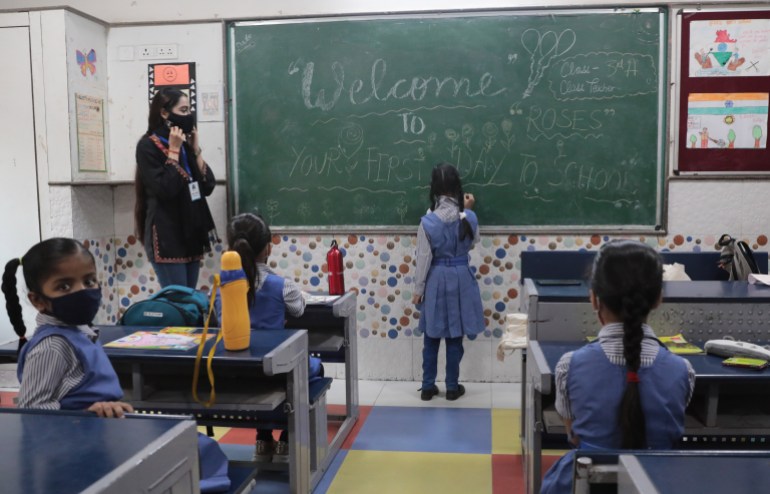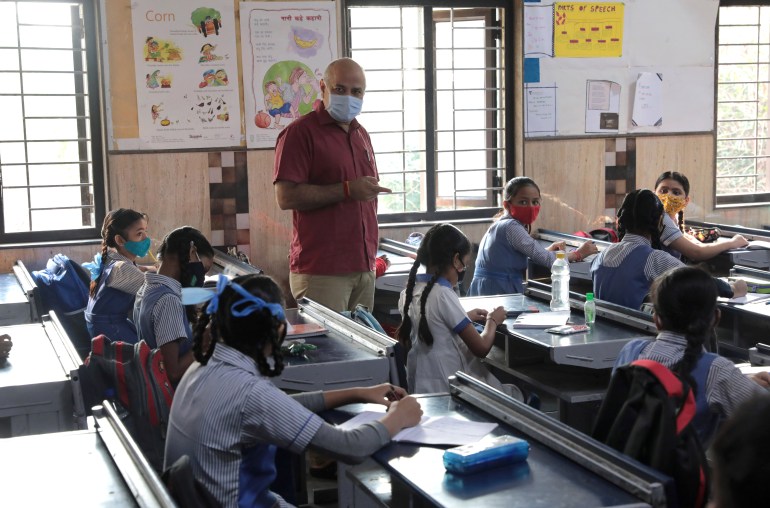Schools in Indian capital reopen for all classes after 19 months
Conditions include ensuring no more than 50 percent attendance and not forcing parents to send their children to school.

New Delhi, India – For the first time in nearly 19 months, 14-year-old Kainat Habeebi attended her classes physically in a school in India’s capital New Delhi.
Though the students did not exchange hugs or shake hands, the giggles on their faces filled the Monday morning air at a school in the sprawling city’s Malviya Nagar area.
Keep reading
list of 4 itemsIndia: New Delhi to relax lockdown as COVID cases decline
A Delhi family’s COVID nightmare: ‘We’re rationing dad’s oxygen’
Kashmiri children return to schools after two years of lockdowns
“We are excited to be back at school. The reunion is really a blessing” Habeebi told Al Jazeera.
The Delhi Disaster Management Authority (DDMA) last week announced that schools would reopen for all classes from November 1 with certain conditions, including ensuring no more than 50 percent attendance and not forcing parents to send their children to school.
The schools have also been directed to ensure the complete vaccination of their staff members.
Met this special Doctor today in a school class room.
Full body check up, injection, medicine prescription, and instructions to ‘avoid icecream..’
God…I was missing this…. pic.twitter.com/3HIQc2W433
— Manish Sisodia (@msisodia) November 1, 2021
All schools in Delhi were shut in March last year following the coronavirus outbreak. They reopened for higher classes in January this year before closing again in April as a brutal second wave of the pandemic devastated India.
After a prolonged closure, the classes for senior grades opened again on September 1. But there was no official approval to open the schools for younger children.
‘One loses interest’ in online classes
Habeebi and many other students told Al Jazeera they did not like online learning and would prefer physical classes while maintaining COVID-19 protocols.
“During a physical class, all the students remain very attentive and concentrate on their lessons, but that’s not the case with online classes,” Habeebi said.

Shabreen, another student who goes by one name, said she is happy to return to school since it was “very difficult” for her to sit in front of a computer screen or mobile phone for hours.
“One loses interest. Also, sometimes you miss lessons because of poor internet connectivity.”
Garima Sharma, who teaches maths and science at a Delhi government school, told Al Jazeera that teaching during the pandemic had been an “uphill task”.
“You cannot teach maths to anyone by speaking up. You have to write step by step to make them understand,” she said. “Online studying is really very messy. You will never know what the student is doing, they might even be sleeping.”

Sharma said while she is happy about her school’s reopening, she is also scared as well.
“Overall, I am excited to see kids back to school because it’s been a long time they have been staying home. But I am having a mixed feeling. I am scared because COVID is like an acid, as we say in chemistry. It’s very corrosive,” she told Al Jazeera.
“We are taking all the precautions. We are making only one student sit on a bench rather than two or more which we used to do before the pandemic. We have also bifurcated sections into sub-sections so less students sit in a particular classroom.”
Drop in COVID cases
The decision to reopen schools for younger children in Delhi was taken amid a significant drop in COVID cases in the capital, which recorded just four virus-related deaths in October, its lowest since March 2020.
On Monday, India’s health ministry reported 12,830 new cases in the last 24 hours. In total, India has reported more than 30 million COVID infections and 458,000 deaths.
A vaccination drive that began in January reached a milestone last month when a billion doses of the vaccine were administered. India has fully vaccinated more than 291 million people while another 707 million people have received the first dose.
The government aims to fully vaccinate about a billion people by the end of the year. Vaccination for children is also likely to begin soon after a government panel recommended the homegrown Covaxin jab for children in the 2-18 age group.
A Delhi government spokesperson told Al Jazeera on condition of anonymity the decision to reopen schools was taken in view of the sizeable decrease in COVID-19 cases.
“The government is vigilant. Also, everyone from teaching to non-teaching staff is vaccinated,” he said.
“If any school is caught flouting the rules, strict action will be taken,” he added, including “immediately shutting” a school if any virus infection is detected there.

Though the children are excited to return to their schools, some concerned parents said they do not want to send their kids to school yet.
Drisha Adhikari is a grade four student in a private school in Delhi. On Monday, she took her classes online.
“Physical classes are better as we can meet friends and teachers, and they are more fun than online classes,” said Drisha.
But her mother Anamika Adhikari said she does not want to send her daughter to school because children in India are not vaccinated yet.
“Though I want her to go back to school as soon as possible, I am also worried. Even if schools open completely, I will not send her initially because I want to see how it goes.”